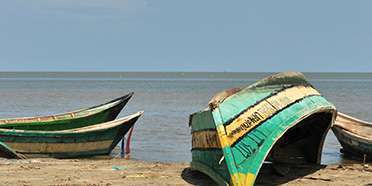- You are here:
- Home
- Countries & Parks
- Kenya Parks
- Lake Turkana
- Reviews
- Expert Reviews
Expert Reviews – Lake Turkana

Nana is a travel writer and author of multiple guidebooks, including the Lonely Planet guides to Africa, Zambia & Malawi and South Africa.
2 people found this review helpful.
Emerald splash in an untamed terrain
Visiting Lake Turkana, the largest desert lake in the world, is a real adventure. For the cash-rich and time-poor, it’s a flight in a private light aircraft over the blistered earth below. For everyone else, it’s a couple of days of hardy overland travel from Nairobi. However you choose to come, your first view of the lake – a slash of iridescent jade, stretching down along the Great Rift Valley from Ethiopia - is one that will stay with you for a long time.
There are three national parks at Lake Turkana: Sibiloi National Park, South Island National Park and the Central Island National Park. Much of the wildlife that you find here is fitting to the harsh landscape, including Nile crocodile, plentiful venomous snakes and scorpions. Mammals include zebras, hippopotamus, gazelle, hartebeest, lion and cheetah, though this isn’t the place to come to see big cats.
Facilities here are few and you won’t meet many other travelers and that is the appeal. Traveling in a Landcruiser across bleak desert and past dramatic volcanic backdrops; encountering traditionally dressed nomadic pastoralists herding their camels; and sleeping in absolute tranquility in rustic Turkana style huts beside the lake are among my favorite Kenya experiences.

Ariadne is a renowned African wildlife photographer whose work is featured in many well-known guidebooks and magazines.
1 person found this review helpful.
The Jade Sea in Kenya’s Remote Northern Region
Lake Turkana, often referred to as the Jade Sea due to its stunning turquoise waters, is the largest permanent desert lake in the world and the most saline lake in Africa. Located in the arid northern region of Kenya, it stretches approximately 250km.
Reaching the lake involves crossing the inhospitable Chalbi Desert, a rewarding journey for adventurous travelers. During my trip north I also explored other highlights, including Samburu National Reserve and Marsabit National Park.
Wildlife is scarce, but animals you might see include gerenuk, dik-dik, reticulated giraffe and Beisa oryx. When out on the lake you’ll probably see some monster crocodiles as well. Fishing is a significant activity in Lake Turkana and an important food source for local communities. Nile perch and Turkana tilapia are the main targets for sport fishing.
For me, the most interesting aspect of this remote region is the opportunity to interact with people from ancient tribes that still live very traditional lifestyles. The lodges will organize visits to local communities on request, but if you are like me, you might prefer the less formal interactions that happen organically when walking around a village unguided.


 Kenya Parks
Kenya Parks